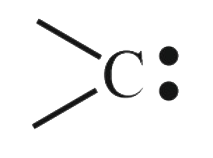The intermediate never formed during chain growth polymerization is
−| C−|
−| C⊕|

−| C.|
The correct Answer is:C
To solve the question regarding which intermediate is never formed during chain growth polymerization, we will analyze the types of intermediates involved in this process.
1. Understanding Chain Growth Polymerization:
- Chain growth polymerization involves the sequential addition of monomer units to a growing polymer chain. This process can occur through various mechanisms: free radical, cationic, or anionic polymerization.
2. Identifying Intermediates:
- In chain growth polymerization, the common intermediates formed are:
- Carbocations: Formed in cationic polymerization when a positively charged carbon atom is generated.
- Carbanions: Formed in anionic polymerization when a negatively charged carbon atom is generated.
- Free Radicals: Formed in free radical polymerization, which are highly reactive species with unpaired electrons.
3. Examining the Options:
- The question presents several intermediates, and we need to determine which one is not formed during any of the chain growth polymerization mechanisms.
- Carbocation: Can be formed during cationic polymerization.
- Carbanion: Can be formed during anionic polymerization.
- Free Radical: Can be formed during free radical polymerization.
- Carbene: A carbene is a neutral species containing a carbon atom with only six valence electrons (R2C:), which is not typically involved in chain growth polymerization.
4. Conclusion:
- Among the intermediates listed, carbene is the one that is never formed during chain growth polymerization. Therefore, the answer to the question is option 3: Carbene.
Final Answer:
The intermediate that is never formed during chain growth polymerization is Carbene.
---
- Chain growth polymerization involves the sequential addition of monomer units to a growing polymer chain. This process can occur through various mechanisms: free radical, cationic, or anionic polymerization.
- In chain growth polymerization, the common intermediates formed are:
- Carbocations: Formed in cationic polymerization when a positively charged carbon atom is generated.
- Carbanions: Formed in anionic polymerization when a negatively charged carbon atom is generated.
- Free Radicals: Formed in free radical polymerization, which are highly reactive species with unpaired electrons.
- The question presents several intermediates, and we need to determine which one is not formed during any of the chain growth polymerization mechanisms.
- Carbocation: Can be formed during cationic polymerization.
- Carbanion: Can be formed during anionic polymerization.
- Free Radical: Can be formed during free radical polymerization.
- Carbene: A carbene is a neutral species containing a carbon atom with only six valence electrons (R2C:), which is not typically involved in chain growth polymerization.
- Among the intermediates listed, carbene is the one that is never formed during chain growth polymerization. Therefore, the answer to the question is option 3: Carbene.
The intermediate that is never formed during chain growth polymerization is Carbene.
Topper's Solved these Questions
Similar Questions
Knowledge Check
- Question 1 - Select One
In chain growth polymerization initiator is
Afree radicalsBcationsCanionsDone of these - Question 2 - Select One
Which one is a chain growth polymer?
ATeflonBNylon-6CNylon-6,6Dbakelite - Question 3 - Select One
Which one is chain growth polymer ?
AStarchBNucleic acidCPolystyreneDProtein
The intermediate formed during the addition of HCl to propene in the presence of peroxide is
View SolutionThe intermediate formed during the addition of HCl to propene in the presence of a peroxide is
View SolutionThe intermediate formed during cross aldol condensation reaction between acetaldehyde and formaldehyde is:
View SolutionAn example of chain growth polymer is______.
View SolutionThe intermediate compound formed during hydrolysis of acetonitrile to acetic acid is
View Solution

